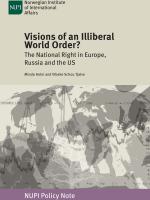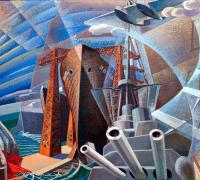Why Trump, Putin, and the European right unite around ’saving’ the West
For decades, Western foreign-, defense- and security strategy has become used to focusing mainly on potential threats from the outside: Middle Eastern terrorism, African state fragility, authoritarian strongholds or Chinese assertiveness. We now know that this idea of a post-conflictual or even ’post-historical’ liberal transatlantic zone was too optimistic.
Indeed, as a recent Norwegian white paper holds, the most urgent and most complex challenge to existing liberal principles (human rights, rule of law, division of power) and Western-anchored institutions (EU, NATO, WTO) may now very well come from the rise of a new national Right within the West itself.
In a new NUPI policy note, DIIS researcher Vibeke Schou Tjalve, and DIIS-NUPI PhD student Minda Holm, explore why and how the national right in such diverse contexts as the US, Italy, Poland, Hungary, Austria, Britain, France or Germany finds itself on common ideological ground with the national conservatism of Putin’s Russia – not least in relation to their views on foreign policy and world order.
To understand this ideological marriage, the authors argue that we must unpack one of the most basic or ’deep’ components to national Right identity in both the US, Europe and Russia: the narrative of Western liberalism as a decadent form of cultural suicide and the notion of national conservatism as the ‘savior’ or ’guardian’ of an older, more authentic Western or pan-European civilization. In order to defend this notion of an older Western civilizational order – one based on respect for state sovereignty and on appreciation of the cultural and ethnic distinctivenes of nations – national Right governments, parties and movements across the West – including Russia - seem increasingly interested in teaming through trans-national meetings, networks and organisations.
The new NUPI policy note explores this emerging trans-national cooperation and its implications for Western institutions and interventionism. How does the national Right in the US, Europe and Russia view such central institutions as the UN, EU or NATO: Does it want to reject or coopt them, refuse of reform them? And how does it position itself on the complicated issue of interventionism – a practice and language of humanitarian support which the national Right both rejects and at other times adopts.
Most importantly, the NUPI policy note discuss a number of built-in tensions, dilemmas and unpredictabilities in the composite ideological landscape that ties a US-Europe-Russian national Right foreign policy alliance together. These include:
- State sovereignty or ‘the People’? In the US, Europe and Russia, the national Right articulates itself as democratic, casting its defense of national sovereignty with reference to the state as protector of ‘the People’. This is often done in the language of respecting the ‘cultural diversity’ between national traditions. This rhetorical strategy puts a number of caveats on the future politics of the national Right. Shall its commitment to ‘cultural diversity’ amongst states force it to accept some level of cultural diversity and minority protection in the domestic realm too? And shall its fetishization of ‘the People’ occasionally force it to put intervention over sovereignty in instances where ‘the People’ is simply too blatantly abused?
- Anti-interventionist - but militarist? The national Right is firmly united around a position of anti-humanitarian interventionism. And yet its ideological agenda often revolves around, and depends upon, the symbolic language and publicly mobilizing functions of state militarism. In other words: while the national Right may reject the kinds of long, legally regulated wars of democratization or ‘peacebuilding’ waged by the West in recent decades, may it still be likely to commit to other forms of visible military action (in the realm of counterterrorism for instance) seeking out security politics as an arena within which to display leadership, authority or virility?
- Global trans-national conservatism or local Anglo-Saxon identity? The national Right in both the US and Europe occasionally articulates itself as part of a larger global trend, casting the divide of future global politics as one between atheist, decadent materialism and religious or conservative traditionalism (be it Hindu, Muslim, Christian, or Confusian). This vision completely disrupts the existing Western security community, including the foundational identity of NATO. Is this the most likely development? Or will the national Right in the transatlantic zone ultimately fall upon, or prioritize its other and in some ways competing narrative of a distinct and superior ‘European’ civilization? And if so: Will Russia be constructed as cultural entity within or outside of that ‘Europe’?
- Disrupting or empowering the state? Can the tensions between the disruptive, combative and anti-establishment ethos of a British, American or Italian nationalist Right, battling globalist elites within their own government and bureaucracy and at war with ‘their’ current states, be squared with the kind of ‘big state’ – even total state – vision espoused in such countries as Poland, Hungary and Russia? This question is not simply one about the ultimate ‘unitability’ of ideas. It is also one about the ‘unitability’ of personalities or styles of politics. Beyond the immediate temptations of joining hands, can the combative, disruptive, ‘civil warrior’ cast of characters that tend to head the agenda of ‘anti-establishment’ politics in the US and Western Europe, find long-term working relationships with national Right leaders outside of the Western realm, which tend to prefer to carry themselves more as the poised and steady stewards, of an older, wiser creed of order?


